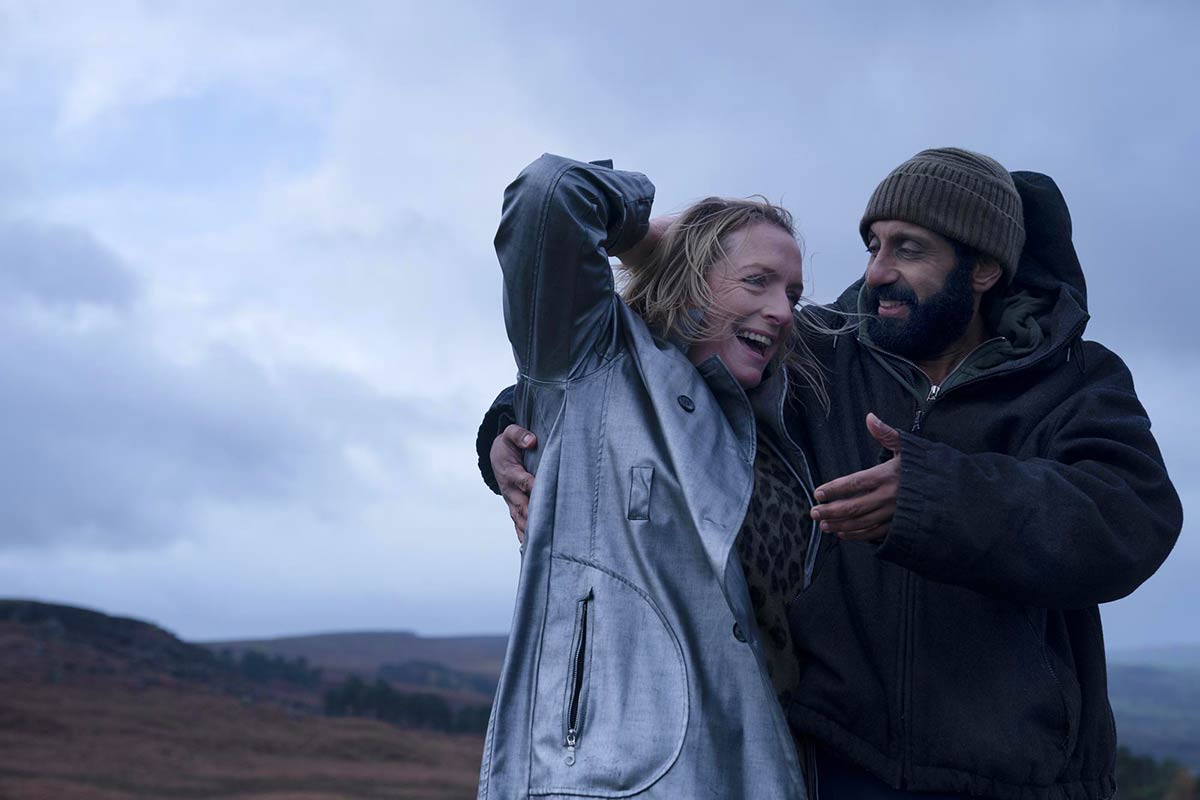What do fans of Sylvan Esso dance house remixes and Bob Dylan have in common? Almost nothing, you’d imagine, and you’d probably be right. But in Clio Barnard’s sweet, unlikely romance “Ali & Ava,” which premiered as part of Cannes’ Directors’ Fortnight program, the two titular characters—both from opposite musical camps—learn to find common ground in each other’s preferences and more, to share in each other’s lives. The film is a moving yet realistic exploration of a relationship across a cultural and class divide in northern England, and the film smartly skirts playing into the stereotypes of the region. However, Barnard can’t quite avoid the tropes of more conventional romantic fare, which don’t feel like pitfalls until the film’s predictable and tidy last act.
READ MORE: Cannes Film Festival 2021 Preview: 25 Films To Watch
Ali (Adeel Akhtar) and Ava (Claire Rushbrook) have very little in common. He loves bass-heavy dance club music, and she prefers the soft crooning of country and folk (“You can’t dance to that,” he scoffs incredulously, until they both do, trading headphones and jumping on the couch like children). He’s the landlord of a local family, who has a close enough relationship that he picks their youngest daughter up from school each afternoon, and she’s their daughter’s classroom assistant, a young grandmother of five. He’s separated from his wife, Runa (Ellora Torchia) after a miscarriage—secretly, so as not to disrupt the family equilibrium—and she’s twice-divorced, most recently from a now-deceased abusive skinhead whose memory still lives on in unpleasant ways in her son, Callum (Shaun Thomas).
READ MORE: Summer 2021 Preview: Over 50 Movies To Watch
The skeletons in both their closets threaten to throw their relationship off-course for the film’s entire duration. From Ali’s watchful family to the violent overprotectiveness of Callum, the couple’s affair is under constant attack. Though Callum’s wild, sword-swinging attacks are literally unsafe, the more penetrating scrutiny comes from the small, confused stares from family members and onlookers, as if to question the fundamental nature of their love, to put into doubt its moral correctness. Even Claire doubts the affair from its conception: “I’m such an idiot for thinking he might’ve fancied me,” she worries, humiliated. And even though she’s eventually proven wrong, Barnard plays into the human truth of this moment. How bizarre it is to be known and seen, much less loved.
READ MORE: The 100 Most Anticipated Films Of 2021
But perhaps those two are similar phenomena. The small moments of observation between Ali and Ava are the moments in which Barnard captures the quiet thrills of new love: Ava watching Ali pile the neighborhood children into his car to drive them all home, Ali receiving Ava’s Zorro-themed apology note in reference to an earlier incident. The same could be said of Barnard herself, who tracks these characters’ intimacy with close-ups and lingering stares. Yet she offers them a modicum of privacy, too, cutting away quickly in the frames before they kiss for the first time as if to show the embrace would be a transgression on a private moment.
READ MORE: The 25 Best Films Of 2020 You Didn’t See
“Ali & Ava” presents a love letter not simply between people but to a place: Barnard renders Bradford, with its beige brick estate residences and foggy mornings, with precise care. Claire’s home in Holme Wood, the housing estate where she lives, feels truthful and lived-in; the couches have been shoved together in what one character terms a “boat,” and when her grandchildren arrive and request Pot Noodle for tea, Barnard creates the sense of habitual care. This is a home where children have been cared for, even when their mother hasn’t, and Claire’s easy maternal kindness is palpable in every square inch of the frame.
Barnard can’t help but indulge in a few tropes, quickly tying up the film with a sweet and perfunctory resolution, perhaps most noticeably when a brief, offscreen conversation resolves a conflict spurned from (what has seemed up until the moment like) deeply ingrained racism. The plotline with Ali’s family similarly never gets the closure it seems to demand from the outset, though perhaps Barnard asserts here that Ali and Ava are, after all, adults making their own choices who don’t need the approval of their families; fair, except that their families have provided the lion’s share of the conflict.
Still, the aftertaste of “Ali & Ava” is sweet, like the last fading beats of a dance song. Akhtar and Rushbrook share a natural, warm rapport, even before their relationship becomes romantic. It’s not the steamy, erotic affairs of the other entries at Cannes this year, unlike Eva Husson’s “Mothering Sunday” or Verhoeven’s “Benedetta.” But that’s the point: Love doesn’t always have to be intense and fraught. Like Barnard’s film itself, it’s best when it’s simple. [B+]
Follow along with our full coverage from the 2021 Cannes Film Festival here.





